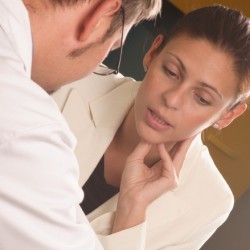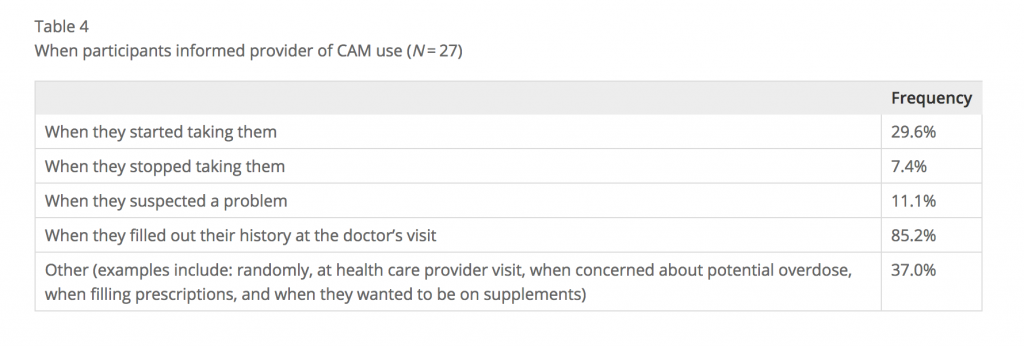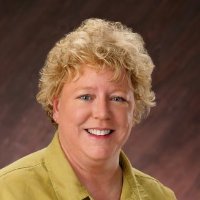One of the most useful tools in your medical kit isn’t the latest pharmaceutical, supplement or integrative therapy, it’s patient communication. A recent small study highlighted that when it comes to complementary and alternative medicine (CAM), Americans report widespread interest and usage (30-53%% for adults, 12% children), but too often than not, they fail to communicate what they are doing with their physician. And because hazardous interactions between botanicals, supplements and prescription drugs can occur, open dialogue is essential for safety, efficacy and ideal patient outcomes.
We asked contributor and colleague Mary Louder, DO for her opinion on the study and on the topic of patient-practitioner communication in general. The following is what she had to say. But before we get to her comments, here is a summary of the recent study, Patient needs and preferences for herb-drug-disease interaction alerts: a structured interview study, published in BMC Complimentary and Alternative Health, May 2017.
Purpose and Method
The objective of this study was to discover patient information needs and preferences for herb-drug-disease interaction alerts.
The study recruited 50 people from several locations within the University of Utah Hospital to participate in this structured interview study. They were asked to provide their preferences for the herb-drug-disease interaction alerts. Qualitative methods were used to reveal the themes that emerged from the interviews.
During the interviews, research staff members asked a series of questions according to the study  script (see Additional file 1). The questions were either multiple choice or short answer format. The answers from study participants were recorded in handwritting by the staff. In order to ensure that all interviews were conducted in a standardized format, a staff training session was held before patient recruitment.
script (see Additional file 1). The questions were either multiple choice or short answer format. The answers from study participants were recorded in handwritting by the staff. In order to ensure that all interviews were conducted in a standardized format, a staff training session was held before patient recruitment.
Barriers to communication with providers about CAM use
RESPONDENT 21. They have never asked. I didn’t think it was a big deal.
2. Perceived unimportance or irrelevance
RESPONDENT 44. I guess I just never saw it as important.
3. Partially informed health care provider of supplement use:
RESPONDENT 41. Yes, she (doctor) is aware of the vitamin D. Hasn’t told her about vitamin B yet.
 Conclusion
Conclusion
In addition to conventional medicine, many patients regularly use complementary and alternative therapies. And yet, communication between patients and providers about CAM use is not consistent. There is a demand for interventions in health care that provide timely, integrative communication support. Delivering the herb-drug-disease alerts through multiple channels could help meet critical patient information needs.
Mary Louder, DO on Practitioner-Patient Communication
 In reading this article about patient needs and preferences in understanding herb-drug interactions, I could not help but think, “Well, at least the desire to discuss supplements with a respective physician is apparent, but there is also undeniable fear that patients feel.” In my opinion, the primary barrier to communication is fear of speaking to the doctor and the fear of confronting the physician’s attitude about supplementation and complementary and alternative treatments.
In reading this article about patient needs and preferences in understanding herb-drug interactions, I could not help but think, “Well, at least the desire to discuss supplements with a respective physician is apparent, but there is also undeniable fear that patients feel.” In my opinion, the primary barrier to communication is fear of speaking to the doctor and the fear of confronting the physician’s attitude about supplementation and complementary and alternative treatments.
As a seasoned physician, seeing this type of fear from patients is very concerning and I understand their feelings. It can be intimidating to approach your physician to try to be persuasive about a particular model of care. As physicians, we sometimes barely have time to communicate the basics in each appointment, let alone take more time to answer questions or cross reference information on supplements and medications. Furthermore, the physician may lack knowledge in this area and may lead them to feel vulnerable or “less than” in the eyes of the patient. The physician may even have a strong bias against all or certain supplements. Patients often fear they will hear things like “no need wash your money down the commode.”
The idea that the physician is uncomfortable, unknowing, or even the not a believer in the use of certain therapies is the most concerning part of this study. This type of thinking is obsolete in my opinion. Here is why.
- I don’t know. There are data bases such as ePocrates and the Physician’s Desk Reference (PDR) as well as a myriad of other references where this information can be obtained. This information may also be imbedded in some e-prescribing software. There is solid evidence regarding interactions of a number of drugs and supplements, the idea of not knowing just doesn’t exist. This is now common knowledge.
- There is not enough time to discuss this topic. While this may be true for the physician themselves, utilizing staff and even identifying a “champion” within the staff who can organize and have this information available for patients is an efficient way for the patient to feel empowered by their interest. Another thought is utilizing a clinical pharmacist. A clinical pharmacist can work with physicians, staff and patients to improve the knowledge and communication regarding the complexities of drug and supplement usage. Clinical pharmacist should be thought of as part of the patient’s team approach to care. So, it may be as simple as fine tuning or evolving your process or systems within the office to use other resources to educate and communicate with patients. By doing so, the burden does not need to be on the physician “alone.”
- Take an introspective moment. Pause, take a breath and take time to consider your own attitudes about supplements, medications, complementary and alternative care. Reflection on these issues may reveal areas that you feel both comfortable and uncomfortable. That’s OK. Your reflection may reveal areas where you can improve your knowledge base. And finally, you may see where you are holding bias or judgements in your heart and how this influences your approach, your communication and your experience with patients.
While certainly, we have each taken the oath to first do no harm, it is clear that our medical system, patients and models of care are calling for the inclusion of more knowledge, communication and strengthening of our patient relationship.
~ Be Well
Mary Louder, DO
Dr. Mary Louder has been practicing Osteopathic medicine since 1993. She is board certified in family practice and integrative holistic medicine. She practices in Lafayette, CO where she owns and operates The Colorado Integrative Medical Center. Dr Louder believes in the importance of the doctor-patient relationship as the foundation of excellent care, and she works with all of her patients in an individualized and holistic manner. She also has a passion helping other practitioners create and launch their own dream practices, through her consulting services at Cairn Medical Consulting. For more information on her practice, click here, www.COintmedctr.com. She can also be reached at Cairn Medical Consulting, www.cairnmed.com.





